Champion’s Mojo Podcast: Olympic Champ Cullen Jones Talks Prioritizing His Purpose
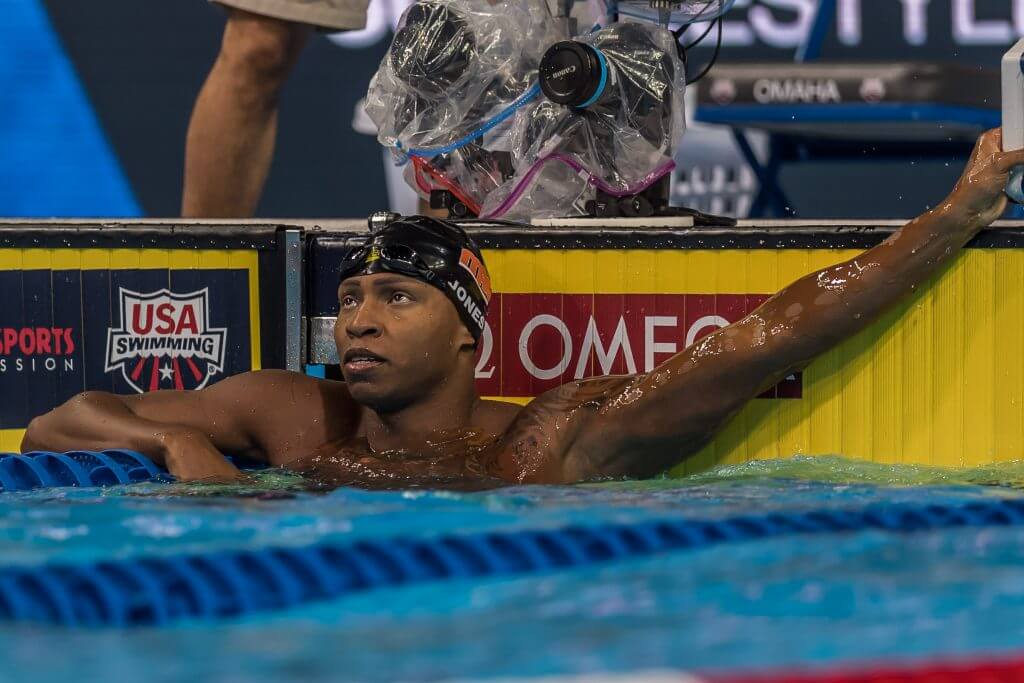
Champion’s Mojo Podcast: Olympic Champ Cullen Jones Talks Prioritizing His Purpose
A two-time Olympian, gold medalist and world-record holder, Cullen Jones nearly drowned at a waterpark as a child. Today, he is the most decorated black swimmer in history. Cullen joins Kelly Palace and Maria Parker to talk about his competitive drive as an athlete and the organizations that he is involved in to promote inclusivity in the sport of swimming and how purposeful living might have changed his swimming success.
Below is an abridged Q&A of the interview, conducted by Kelly Palace and Maria Parker, with Cullen Jones. You can listen to the full podcast episode #85 at https://championsmojo.com or by clicking for the audio here. Or a new option is to watch the full interview on video here.
Champion’s Mojo: What have you been up to recently?
Cullen Jones: Well I have a son who is 13 months old. He just had his first birthday. I think he likes the water more than I do. He kept crying and me and my wife were trying to figure out what to do. Then, for some reason, I went to wash my hands and he stopped crying. My wife looked at me and said to keep the water running. When the water was running, he stopped crying. He loves water. Anything about water. He loves it and loves the sound of it. He loves his bath. It’s his favorite time. It’s funny that you brought up my story because I was the same way as a child. My mom used to put me in the tub and I would just play. It looks like that trait has been passed on to him.
Champion’s Mojo: How have you been coping with this year and what has your mindset been during this pandemic?
Cullen Jones: I recently took a job with Speedo, so I
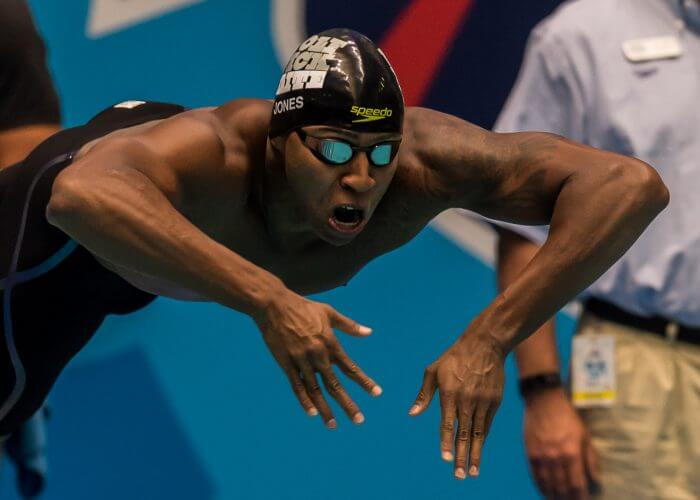
Photo Courtesy: Peter H. Bick
have been working at a hospital for their foundation. I was working with the Make a Splash initiative. As a professional swimmer who’s been in the water for 12 years representing their country, I didn’t know what I was going to do after I left the sport. There has to be an after. I’m so thankful for the work. I understand what it means to try to raise money for a cause that is bigger than myself. I got to work there for eight months before COVID hit. When I tell you I was baptized by fire, at that point, it was all we could do to try to raise money for our front lines. There was no greater calling. I loved every minute of it. Then I got a phone call from the president of Speedo and he’s like, I love what you’re doing, but your voice is louder than swimming. He’s right. Although I was called to do that work for the hospital here, I feel like I was also called to work back with Speedo. The job is still the same. I’m a philanthropic sales manager. What we do is everything that people buy from Speedo, we’re giving it back to the teams too. We know they need it the most right now during COVID. Pool space isn’t cheap. We really focus on giving back. My life has just been about giving back. I love that aspect and the way my life was trending. I never thought that that would have been possible. COVID hit me like a ton of bricks. But it also opened up this door for Speedo. On the other hand, when it comes to civil unrest, that also hit me like a ton of bricks. The day after George Floyd died, I walked outside of my house. I spent 12 years as an Olympian, representing this country. I walked my nice French bulldog, which are not cheap. I walk him outside this nice house, which is my brother-in-laws house while my wife and I build our house, and a cop pulls up. He’s like, hey, how’s it going, what kind of dog is that? Twice he asked me if everything was ok. When he drove off, it hit me like a ton of bricks. I’m a new father. My son is inside. If I was inebriated or angry or short with him or gave him any reason to question me, that could have gone very different. Anything could happen in that time. Why did he turn around? Because I’m in a really nice neighborhood. I’m the only person that stands out because I’m black in this neighborhood, and all of my neighbors are white. I said, this is ridiculous. This is enough. I got to do something about this. So I talked to Lia Neal. We talked about swimmers for change. She was basically in tears. I was like, let’s get all of the black swimmers together. Now, we’re talking with USA Swimming and we’re trying to make systematic change within swimming. For me, the beauty of that is, it’s not for me. I am retired. I am done. I don’t care whether someone asks me for an interview ever again. It’s about my kid who now loves the water so much. I want him to feel welcomed. When I grew up, there weren’t many swimmers or any swimmers that really looked like me going for the Olympic team. I know that I was a role model. I built my pillar on that, but it’s not for me anymore. It’s for him.
Champion’s Mojo: How have you dealt with these experiences before?
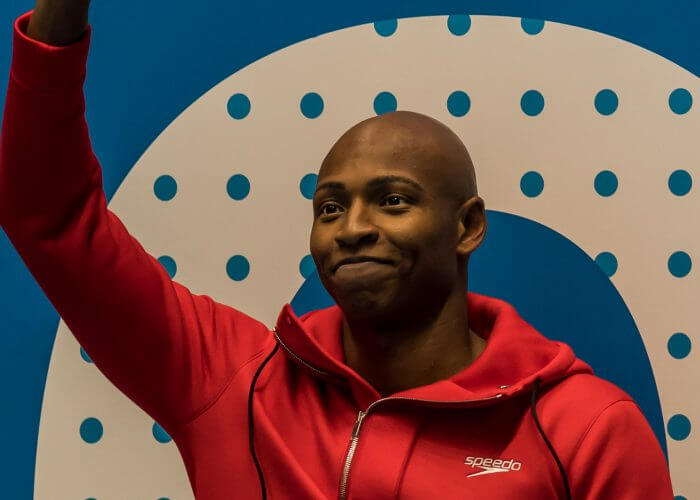
Photo Courtesy: Peter H. Bick
Cullen Jones: I didn’t always have a platform like this to be able to say do something and say something. I grew up in New Jersey, swimming on the Newark Swim Team. It was a very diverse team. We had every culture on our team, but when we raced against other teams, it was very different. You noticed that there was a big segregation where we were the minority team and everyone else was white. That was fine. We didn’t care. I loved swimming. I loved racing. It didn’t come as easy for me as basketball. My dad was a basketball player. He wanted me to be a basketball player. I crushed his dreams and decided swimming is what I wanted to do. He supported me 100 percent. I love the fact that what I put into it is what I got out of it. I love that. I love team sports, but when I play basketball and if three of our guys didn’t feel like playing and we lost the game, that bothered me. It just crushed me because if I’m giving 100% and we weren’t winning, it crushed me. In swimming if I gave that 100% I could turn that 6th place into 5th. Or 5th into 4th. It all changed when that became changing 2nd into 1st. I was fifteen. There was this one kid that just kept beating me, just every time. We swam the 50 free and I touched the wall and looked back to see a funny straight line next to my name. I was so overjoyed. I didn’t warm down. I ran over to my parents. My dad’s jumping up and down. The guy who wanted me to play basketball and he’s just overjoyed because he saw the love that I had for the sport. All the work that I had done. All of that was coming to him. He was just overjoyed. My mom is jumping up and down. I don’t think she even knew my time, she just saw the first place. Then that kid who I had just beat’s mom walked by and said, “shouldn’t he be playing basketball?” My mom whipped around, and she is not one to play with. My dad grabbed her and turned to me and asked if I knew why she said that. I said no. It had been ok when I was getting 6th and 7th, but now that I was beating her son, she was mad. It was OK when you were in your place, but now that you’re showing you’re better, they’re going to hate you. That was the day that I understood haters. That was they day that, when I realized they were mad I was winning, I decided I was going to give them something to be mad about. Fifteen years old. It wasn’t about the Olympics. I never thought I would go to the Olympics. All I thought was that I was going to beat him again. That has been the message that I share in so many talks that I do. I keep telling swimmers, who are all thinking about there not being an Olympics, not being a World Championships, not being a Junior Olympics, all they have to do is win today. What are you doing today to make yourself better? What are you doing tomorrow? Just be better than you were the day before. If that’s reading one book or one page of a book, whatever it is, just focus on that. That’s how I think I got to where I am today. I didn’t look at the big pie. I was staring at Michael Phelps all day. I’d be like, no, never gonna happen. I did it piece by piece by piece to the point where when I was next to Michael I looked at him and said, “you’re next.” He still beat me, which isn’t the point. The point is that I had gotten there.
Champion’s Mojo: What can we do to bring more diversity into the sport so that it’s not an anomaly?
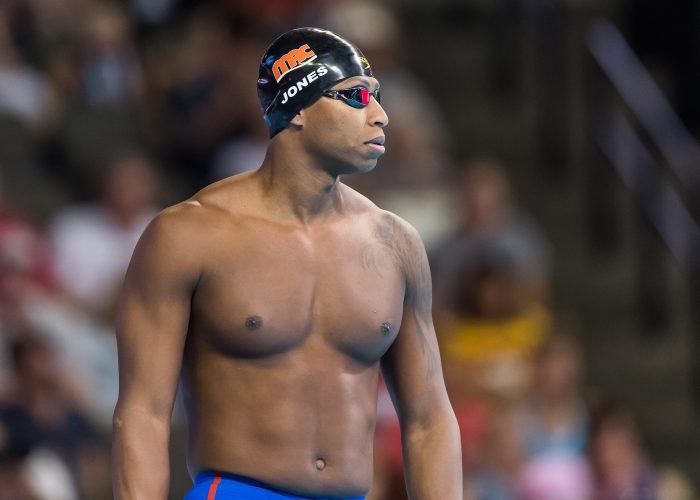
Photo Courtesy: Peter H. Bick
Cullen Jones: Would you like me to cure world hunger, too? For me, it started that day that that police officer came up to me. It wasn’t about me anymore at that moment.In that very moment when I sat back and said, this could have gone terribly wrong. It could have been my last day on this planet. What is the most important thing to me right now? It wasn’t that I wanted a Rolex. It was about my son. So, for me, it was about collecting all of the black swimmers together. Let’s get together. Let’s figure out something that we can do to help the sport. A lot of it honestly is just our time. Which is really hard for Lia Neal. It’s really hard for Simone and Reece Whitley. They’re still on their journey of getting to the pinnacle. Then you have me, who’s retired. I feel like it’s our job to try to move this needle and try to push it so that we can make this sport look more inclusive and how do we do that? We have to talk to USA Swimming. USA Swimming has to also understand that this is important. Look at what basketball is doing right now. Basketball understands what’s going on right now. It’s not something that’s just gonna go away. We need to make systematic change. We need to make this sport look more inclusive. We need to tell out stories. Tell my story. Tell Simone’s story. Tell Lia’s story. Tell the Ulett sisters’ story, who both just made Olympic trials. That’s what needs to happen. When Tiger Woods was playing his best, I even picked up a golf club. Seeing someone be successful is great. I think USA Swimming does a great job of showing that. But where’s the trail. How did that swimmer get onto a good team. How did they swim well in high school. How did they go off to swim in college? How did they get that shot? Where I grew up, it wasn’t a great area, but I ended up going to NC State. I learned so much in four years and was able to vault into a career. There is so much drop off in these sections. Learn to swim. Great. Get on a team. There’s a drop off there. Get into high school. There’s a drop off. Going from high school to college. Huge drop off there. It’s these little divots that we need to really work on and we need to make sure that we can figure out from grassroots to Simone Manuel, how do we track getting there. The best way to do that is by showing the path to get there. Sharing it with your followers. That’s what’s gonna make the sport more inclusive. That’s how people are going to be more likely to choose swimming and feel they may be successful. That they can get out of where they live by swimming. Kids in these lower income areas are looking for ways to get out of where they are. Whether it’s rapping or basketball or swimming, about having that exposure. That’s why I love to Make-A-Splash. That’s why I love what I do when I get to go out there.There is a career in this. I was able to travel. I will be able to, when things open up, take my child to travel. All because of swimming. There is a way out through this sport. From the ground level up, that’s what they need to hear.
Champion’s Mojo: What is it about swimming that has helped you be able to stand up and speak on these topics?
Cullen Jones: I think a lot of it is the things you learn. Swimming taught me time management, leadership, all of these things. I’ll be honest, that’s why I want my child to play a sport. I don’t care what it is, but play something. You learn teamwork. You learn leadership. You learn time management. You learn to divide your time and be punctual. When I came into the business world and I met people that weren’t in sport I realized they don’t value those things. They don’t value necessarily being on time. They don’t value all of these things that leadership, CEOs, other people that are at the top, really value. That is just innately in my culture to do. It’s what I learned to do. I was nervous coming out of swimming because I didn’t know what I was going to do. Am I going to be a fashion designer or an editor? I didn’t know. Then I got into the job force and I started working with people and was giving that 100% effort, always being on time, to that, just like how I was as an athlete. I think that’s why you hear all the time that CEO’s hire athletes in a heartbeat, because they can teach all the other stuff. I can teach you how to use all these other databases. What I can’t teach you is ownership. I can’t teach accountability. There’s so much I can teach and tell my son, but when you’re on a field or you’re behind the block and it doesn’t go the way you want it to go, how do you handle failure? That’s something that sport teaches you that most people do not understand. I think it is a big problem in our society today because we are so quick to get a phone and get instantly happy because everything’s instant, instant, instant. When something doesn’t happen instantly, when something doesn’t happen the way that you want it, how do you deal with that? Do you crumble or do you figure it out? That’s what sport teaches.
Champion’s Mojo: What was one of your biggest disappointments or obstacles?
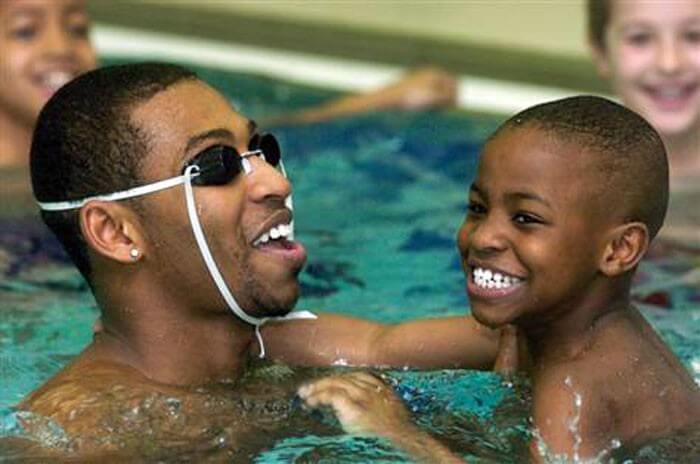
Cullen Jones
Cullen Jones: For me, my biggest obstacle was always staying focused. We hit the pinnacle. I got a gold medal and an American and World record. It’s hard to go in and go to practice and beat yourself up everyday. You get tired of being tired. I always had to find ways to keep myself motivated. My coach would poke and prod me, saying I wasn’t beating Nathan (Adrian) or Jason (Lezak). Saying I wasn’t good enough. I think my focus was always somewhere else. We did Make-A-Splash every May, because it’s national water safety month. Our biggest meet was in June, and I would be traveling two or three weeks the month before because Make-A-Splash was so important to me. If Nathan beat me, but I taught just one child to swim, that was ok with me. At the end of the day, I was saving a life. I love to win. I love gold medals and representing my country. But, at the end of the day, I was saving a life.
Champion’s Mojo: We can see any really “bad” swim, but of course we all do, tell us about any disappointing meets?
Cullen Jones: So, when I went to NC State, I did not have a full scholarship. I wasn’t admitted to the school because my SAT score wasn’t where it needed to be initially. I had to go and retake it again. When I did get in, I started my freshman year in January. I am terrible at standardized tests, but I wanted to be a psychologist. That’s what I wanted to do, to focus on psychology. My freshman year all I did was swim. When you go from age group to college, swimming becomes a job. You’re representing your team. That became so important to me, that I wasn’t letting my teammates down at this higher level, that my focus was more on practice than it was on school. So my freshman year I got sixth. The team threw a party, like, oh my gosh the freshman swam in finals and goth sixth. This is amazing. My grades were where they needed to be and I had to sit out the first half of my sophomore year. We lost to UNC. We beat Duke. UVA wiped the floor with us. Anderson, who was their best 50 freestyler at the time for them, walked by me and laughed because I wasn’t academically eligible. What I found out about myself is I am very bad at standardized tests. I could go to my professor with an answer and he would agree it was right and what he would do, but it wasn’t the best answer the book wanted. That drove me crazy. You’re telling me that the answer is right but it’s just not what the book says. So I switched my major to English. I hated thinking that I was a great writer. I’m a good writer. I can explain to you why I think this is the right way. All of those C’s and D’s became A’s and B’s. As soon as I shifted my direction towards what my strength was, which was English, I never had a problem in school again. When I got to English, it made sense. I never had to sit out again. My struggle is the balancing aspect. Here I am trying to be the best swimmer I possibly can, but I also need to do well in school. I was a B student in high school, but that standardized test crushed me. That sophomore year was the first time, because of that look that Anderson gave me, January 1, when I was able and I had a 2.8 GPA that year, I swam. I won the 50 and 100 at ACC’s that year and went to NCAA’s for the first time. I was a man on a mission after that. So when you say there wasn’t failure, sure there was. It might not have looked like it in the pool, but there were definitely some hurdles that I had to get over because, again, that balancing aspect. My coach saw that shift, to the point where he wanted me to be the youngest captain in NC State history. That next year, he made me captain. The guy who didn’t have the grades the year before. After that it was him and I trying to figure out how to make the team better. That was just my goal. My goal was like, yes, I’m going to be in school because I know that I need to be a better student. But more importantly, my mission was getting better for the next year.
Champion’s Mojo: Were you able to motivate the other NC State swimmers?
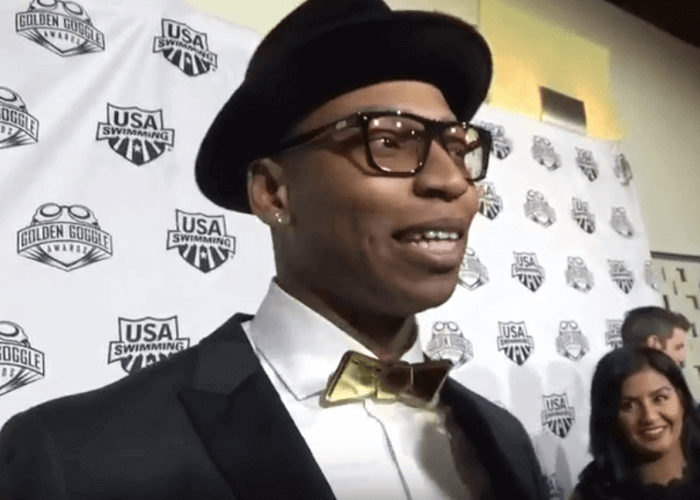
Photo Courtesy: Swimming World TV
Cullen Jones: No, not everybody. I think that’s another thing that I’d like to tell in my public speaking is that it might not be everybody. If you can get a couple to just listen in and motivate them to be better, I think that you can make a serious change. The proof is in the pudding because the next year I wasn’t the only person there at NCAA’s. There were three other guys with me that were on our relay that was ranked 8th. I remember talking to Braden Holloway at the Olympic Trials in 2008 while he was still at Virginia Tech. He was like, the culture at NC State has to change. That was motivation. We’ve got to go to NCAA’s. We’ve got to be ranked in the country. When he got the coaching job I was like, ok, here we go. Within three years we were ranked in the top four in the nation. Change your perspective. That’s all it took.
Champion’s Mojo: What do you have to say to the athletes who lost their seasons?
Cullen Jones: It’s the hardest thing because I didn’t have to deal with it. What I tell them is it’s no different from being behind the block and your goggles snapping. It’s no different from being in a suit and it rips. It’s a hurdle. You can make it as big or small as you need to. It’s hard to have to shift and readjust. I think it’s the hardest thing in the world. There is nobody on this planet that taught me that better than David Marsh, who is like a father figure to me. David taught me how to be a professional swimmer. There was nothing better than having a coach who wants you to be the best you can be, but says he can’t do it unless I do it. That changed my perspective. Swimmers get stuck in a box of this is how it will be. David will come in and have us do practices without goggles. He was teaching us how to adapt to situations.I know this is a small situation that I’m bringing up, but the hurdle is as big or small as if you’re in college, you’re still going up. It moves the hurdle. You can make that hurdle big or small. It stinks, but you have to build on this year.Your goggles broke. That’s that. Now let’s focus again and figure it out. I had this conversation with Ryan and asked where his head was. He just that it is what it is. I wish I could have the mental freedom that he has.
Champion’s Mojo: What rituals or routines did you use throughout your career?
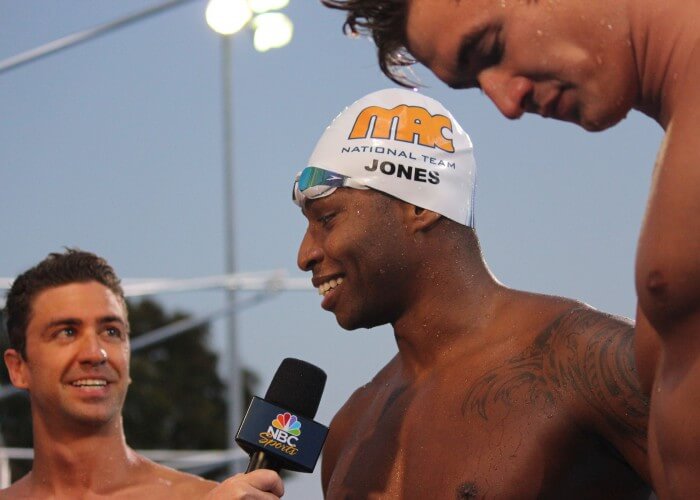
Photo Courtesy: Griffin Scott
Cullen Jones: Most people don’t know this, but Ryan Lochte is the reason I’m a little OCD. He is a clean freak. In 2005-06 I got on my first World’s team and I’m walking down the hall and I heard Lil Wayne blasting out of a room. I look inside to see Ryan rapping every single world. I immediately switched rooms. From then on we were roommates forever. On these trips, you come back from practice, you’re focused on racing, and there’s not much to do. Ryan will clean then clean again. It got to the point that I’d clean my side just so I wasn’t the messy one in the room. Over the years it just got to the point where I did it myself. Michael and Ryan are meticulous. We’re talking about the two titans of our sport. I started looking at what they did in the pool, focusing on their technique. Now people can watch all these races on Youtube, but I had to watch it in person, to be a student of the sport. I would watch their strokes and analyze how the did certain things, then I would try it to decide if it works. That is being a student of the sport. I hated kicking, but it wasn’t until I decided to become a better kicker that I got better. That year I got an American record.
Champion’s Mojo: How did you change a mindset like that?
Cullen Jones: I wanted to be like my friends. I watched the 2008 relay. Don’t get me wrong, it was a great swim, but I was slow compared to Jason and Michael. I’m like, man, I’m slow. So I went back to the drawing board and decided to become a better kicker. That year I worked on it, and the next year I set an American record. I just had to change that mindset. I had to become a student of the sport and watch what others were doing.
Champion’s Mojo: Is there anything else you’d like to say?
Cullen Jones: Everything is pushed by marketing now, so follow me on instagram because I’m doing a lot of things within the world of swimming. You can hear my voice. I’m very devoted to helping spread drowning prevention, as well as making the sport more inclusive. I want people to understand there’s a way of doing this. It takes everyone, all these swimmers, to show others that it’s possible. If I can help, that’s what I’m going to do.
Champion’s Mojo: Great having you with us today! Thank you Cullen! We wish you all the best!
Cullen Jones: My pleasure, thank you for having me!



